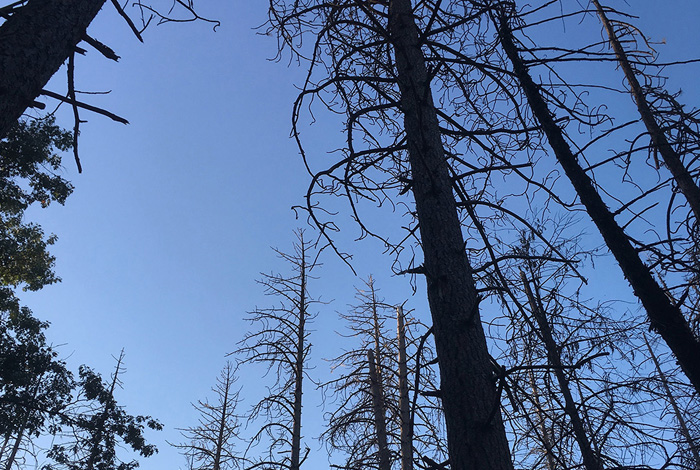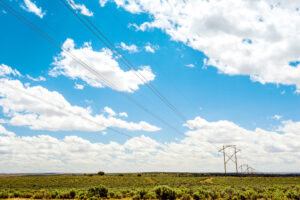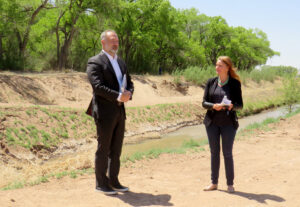Warming climate leads to more bark beetles killing trees than drought alone

A team of researchers using Los Alamos National Laboratory’s supercomputers developed a model for projecting tree kills by bark beetles as the climate warms .
Looking at forests in California, the team of researchers found that western pine beetle infestations killed 30 percent more trees due to warmer temperatures than they would have killed under drought conditions alone.
While the study focused on California forests, study author Chonggang Xu, a senior LANL scientist, said he anticipates the trend will hold true for forests throughout the western United States, including in New Mexico.
Xu said that the number of trees killed because of warmer temperatures surprised him.
“It’s much larger than I had previously perceived,” he said.
Researchers modeled the beetle dynamics and tree die off during the period of extreme drought from 2012 to 2015 in the Sierra Nevada range in California.
Based on the modeling, the team projects that 35 to 40 percent more ponderosa pines will die from beetle attacks for each degree Celsius of warming.
The results of the modeling and study were published in the journal Global Change Biology.
Xu has previously worked on similar studies about bark beetles and forest dynamics. In 2018, he was an author on a study that found increasing winter temperatures are allowing the beetles to expand their range and that overcrowding of beetles can limit population growth.
While the western pine beetle attacks ponderosa pines, there are other types of bark beetles that go after different species of trees. For example, Xu said around Los Alamos the piñon beetle attacks piñon pines.
By using supercomputer modeling, the researchers assessed the risk that western pine beetles pose to forest ecosystems amid a changing climate.
The lead author on the study was Zachary Robbins, a LANL researcher and a graduate student at North Carolina State University. In a press release, he said forests are considered an important buffer against climate change and reforestation efforts are often touted as an inexpensive way to mitigate climate change.
“Our research shows that warming shortens the time between beetle generations, supercharging beetle population growth,” he said. “That can then spur catastrophic mortality in forest systems during drought in the Sierra Nevada and throughout the Western United States.”
Xu said under normal conditions trees can defend themselves. He said one hypothesis is that the insects are always present in the forests and target weak trees, which maintains a healthy tree population. Bark beetles cannot successfully attack and kill a healthy tree because they need to establish a large population and the tree has defense mechanisms to flush out the insects.
But the western United States is facing a megadrought and climate change models show that drier and hotter conditions will likely impact the region in the future.
This can stress the trees, Xu said, and make them more vulnerable to insect attacks. At the same time, he said bark beetles may be able to complete their life cycle faster, leading to more insects. Warmer winters also mean that fewer beetle eggs die.
“Our study is the first to attribute a level of tree mortality to the direct effect of warming on bark beetles, using a model that captures both beetle reproduction and development rates and host stress,” Robbins said. “We found that even slight increases in the number of annual generations of bark beetles due to warming can significantly increase tree mortality during drought.”
Large trees tend to be more resilient to fire, but are more susceptible to beetles, Xu said. The beetles need to establish large populations and, because of that, they favor the larger trees.
When bark beetles decimate forests, the dying trees release carbon dioxide, which then contributes to climate change.
Xu said the International Panel on Climate Change report released this year did not take into account the loss of trees to bark beetles and how that could impact future warming.
He said it is important for forest managers to understand how climate change can lead to more trees being killed by bark beetles. Xu said forests should be managed to promote a diverse age range of trees rather than removing small trees and preserving the large ones.
Xu said his team is already looking at future studies, as there is still more that needs to be studied.
More than a dozen researchers are listed as study authors, including scientists from LANL and the University of California system, which provided funding for the study. Xu said the team brought on entomologists like Brian Aukema from the University of Minnesota. It also included James Powell, who works in mathematics and statistics at Utah State University, and faculty from North Carolina State University as well as Forest Service employees from both Canada and the United States.
“It’s a very diverse team here and I’m really proud of all the contributions from all of them,” Xu said.
This article was originally posted on Warming climate leads to more bark beetles killing trees than drought alone







